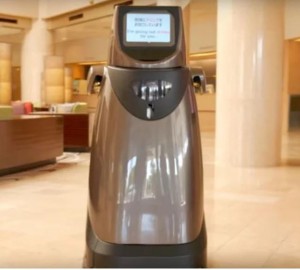 When you visit a Japanese airport or hotel this month don’t be surprised if some staff are little plastic robots eager to help. Panasonic Corporation is currently conducting tests of its HOSPI(R) Autonomous Delivery Robot by giving it temporary jobs at the Narita International Airport and the ANA Crowne Plaza Narita. It isn’t so much because the robots need pocket money as Panasonic wants to demonstrate how HOSPI(R) can function in various roles. HOSPI(R) was introduced in 2013 as a way of taking the pressure off of hospital staff by taking over the routine job of delivering medication and other items. That in itself isn’t news. Delivery robots have been around since the 1960s, but where previous versions used embedded wires or beacons to navigate, HOSPI(R) has a preprogrammed map, sensors, and an advanced collision-avoidance algorithm to get around human environments autonomously without bumping into people along the way.According to Panasonic, HOSPI(R) is already used in four hospitals in Japan and since it’s quick and cheap to install, the company wants to see if the robot can help alleviate the problem of the country’s shrinking and aging work force in other areas.
When you visit a Japanese airport or hotel this month don’t be surprised if some staff are little plastic robots eager to help. Panasonic Corporation is currently conducting tests of its HOSPI(R) Autonomous Delivery Robot by giving it temporary jobs at the Narita International Airport and the ANA Crowne Plaza Narita. It isn’t so much because the robots need pocket money as Panasonic wants to demonstrate how HOSPI(R) can function in various roles. HOSPI(R) was introduced in 2013 as a way of taking the pressure off of hospital staff by taking over the routine job of delivering medication and other items. That in itself isn’t news. Delivery robots have been around since the 1960s, but where previous versions used embedded wires or beacons to navigate, HOSPI(R) has a preprogrammed map, sensors, and an advanced collision-avoidance algorithm to get around human environments autonomously without bumping into people along the way.According to Panasonic, HOSPI(R) is already used in four hospitals in Japan and since it’s quick and cheap to install, the company wants to see if the robot can help alleviate the problem of the country’s shrinking and aging work force in other areas.
For the demonstration, HOSPI(R) will be roaming the Crown Plaza lobby though January 18 offering guests bottled water while announcing bus departures in English, Japanese, and Chinese. Then, from January 23 to 27, the robot will take on a new position at the Narita International Airport’s “Narita Travel Lounge,” where it will act as a busboy collecting dirty dishes and returning them to the counter for washing.
Panasonic emphasizes that there are no plans to give HOSPI(R) a permanent job at either location, but it’s hoped that its short stint will show how the technology has wider applications than previously thought.
1 min read
Panasonic robots take temp jobs at airport and hotel


